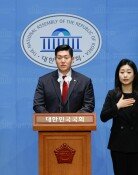[Editorial] Fiscal Soundness
[Editorial] Fiscal Soundness
Posted February. 10, 2010 07:16,
With the fiscal crisis originating from Europe spreading, the Korean government and political circles are struggling to manage fiscal soundness. Seoul is considering selling part of its stake in Industrial Bank of Korea before years end to increase non-tax revenue amounting to 1.2 trillion won (one billion U.S. dollars). It will also reconsider the system of allocating its welfare budget and reduce the issuance of government bonds. Twenty-three lawmakers tabled three revised bills, including one on the National Finance Act that encourages the National Assembly to strengthen risk management of national finance.
By the standards of the International Monetary Fund, Koreas fiscal soundness is better than that of the U.S., European nations and Japan. Over the past decade, however, Korean financial situation has aggravated too rapidly. The national debt snowballed from 60 trillion won (40 billion dollars) in 1997 to 133 trillion won (110 billion dollars) in 2002 and 298 trillion won (320 billion dollars) in 2007. The figure was estimated at 366 trillion won (314 billion dollars) last year. In 1997, the ratio of national debt to GDP was 12.3 percent, but rose to 18.5 percent in 2002, and 30.7 percent in 2007. The estimate for last year is 35.6 percent. The national debt this year is expected to surpass 400 trillion won (343 billion dollars) and the national debt-to-GDP ratio is projected to exceed 40 percent.
If debts not considered part of national debt by international statistics but included as national debt in a broad sense are included, Koreas national debt will rise further. If the official national debt, those of state-owned organizations, debts guaranteed by the government, and the legal reserves of public pension are combined, the national debt was 1,296 trillion won (953 billion dollars) in 2008. When the broader sense of national debt is applied, the national debt-to-GDP ratio soars to 126.6 percent. The countrys fiscal uncertainty should not be exaggerated, but given the fiscal burden being placed on state-run companies, the national debt is large enough to arouse public attention.
Given economic jitters at home and abroad, the Korean government will find it tough to suddenly tighten a large amount of its budget. Nevertheless, Seoul must thoroughly investigate loopholes in the budgets execution and maintain fiscal soundness. Unnecessary spending in the public sector should also be avoided. The governments intent to pursue pragmatic policies for the working class is not an excuse to waste money. In the article The Cruelty of Compassion on the January 28 edition, the Economist said social cohesion has become an excuse for avoiding necessary reforms in Europe in harming many people. Korea should pay heed to this.
Sound finances are the last pillar of hope for a nation facing a crisis. Both nations and individuals should be fearful and wary of the revenge of debts. Effective management of fiscal soundness is a national challenge that should be carefully dealt with.







